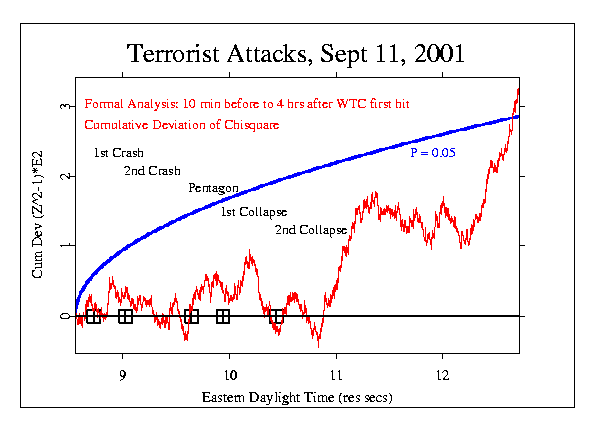This is not the universe, but a parallel subject. An eerie coincidence?
Googling consciousness, random number generator, you'll find:
The Global Consciousness Project
Vid: www.youtube.com/watch?v=cnvJfkI5NVc
Laboratory scientist Dean Radin describes an experiment testing the relationship between mind and matter. In this experiment, random number generators are used to test whether collective human attention corresponds to a change in the physical environment.
and this....
September 11 2001: Exploratory and Contextual Analyses
Roger Nelson, Director, GCP
...The following material shows the behavior of the Global Consciousness Project's network of 37 REG devices called "eggs" placed around the world as they responded during various periods of time surrounding September 11. A book chapter gives a compact summary. These eggs generate random data continuously and send it for archiving and analysis to a dedicated server in Princeton, New Jersey, USA. We analyse the data to determine whether the normally random array of values shows structure correlated with global events. This page shows a wide range of exploratory analyses that provide context for the formal hypothesis testing related to the events on September 11. A number of people have done supplementary and complementary analyses, as well as direct replications. Links to these are provided below. An especially interesting effort was undertaken by Bryan Williams, who used data in 15-minute blocks, to compare with the seconds resolution used in the formal analyses. To the extent his results are similar, this provides some response to the question whether a general, external influence is at work, as opposed to an "experimenter effect" operating via fortuitous (albeit anomalous) selection of the analysis specifications.
The underlying motivation for this work is to discover whether there is evidence for an anomalous interaction driving the eggs to non-random behavior. In a metaphoric sense, we are looking for evidence of a developing global consciousness that might react to events with deep meaning. The whole world reeled in disbelief and horror as the news of the terrorist attack and the unspeakable tragedy unfolded. Our analyses show that the EGG network registered an unmistakable and profound response.
Introduction
I want to acknowledge that I like the notion of Global Consciousness, but that this idea is really an aesthetic speculation. I don't think we have real grounds to claim that the statistics and graphs representing the data prove the existence of a global consciousness. On the other hand, we do have strong evidence of anomalous structure in what should be random data, and clear correlations of these unexplained departures from expectation with well-defined events that are of special importance to people. The events share a common feature, namely, that they engage our attention, and draw us into a common focus.
This is a report of what we see in the data recorded on September 11, 2001 and the surrounding period. It is the best description we can give of measurements and effects that are essentially mysterious. We do not know how the correlations that arise between electronic random event generators and human concerns come to be, and yet, the results of our analyses over the past three years repeatedly indicate such correlations.
much more:
http://noosphere.princeton.edu/terror.htmlincluding lots of graphs....

:crazy: